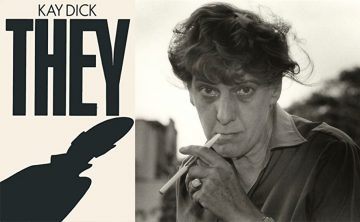Lucy Scholes at The Paris Review:
 It’s apt then that much of the novel’s power lies in its mystery. The narrator—if, indeed, we’re listening to the same single voice throughout—seems to be a writer, who lives in a book-filled ex-coastguard’s cottage, alone apart from their dog. They are never named. Nor is his or her gender revealed, something that’s in line with what Kris Kirk, in an interview with Dick in the Guardian in 1984 described as Dick’s “androgynous mental attitude.” Dick had just finished explaining why the “overall tone” of the personal relationships depicted in her books is always bisexual, which is how she herself identified. She also notes that although she’s sexually attracted to both men and women, there’s “something extra” in her relationships with the latter; “this love, this emotion,” she clarifies. “I have certain prejudices and one of them is that I cannot bear apartheid of any kind—class, colour or sex,” she tells Kirk. “Gender is of no bloody account and if anything drives me round the bend it’s these separatist feminist lessies.” Given that Dick made a habit of loosely fictionalizing her own experiences, I’ve come to think of her protagonist in They as female. Even more inscrutable though are the “they” of the book’s title; “omnipresent and elusive,” as Howard describes them, extremely dangerous and violent, but also strangely vacant and automaton-like. “They” are rarely distinguished as individuals, which situates them in stark contrast to the narrator and her acquaintances.
It’s apt then that much of the novel’s power lies in its mystery. The narrator—if, indeed, we’re listening to the same single voice throughout—seems to be a writer, who lives in a book-filled ex-coastguard’s cottage, alone apart from their dog. They are never named. Nor is his or her gender revealed, something that’s in line with what Kris Kirk, in an interview with Dick in the Guardian in 1984 described as Dick’s “androgynous mental attitude.” Dick had just finished explaining why the “overall tone” of the personal relationships depicted in her books is always bisexual, which is how she herself identified. She also notes that although she’s sexually attracted to both men and women, there’s “something extra” in her relationships with the latter; “this love, this emotion,” she clarifies. “I have certain prejudices and one of them is that I cannot bear apartheid of any kind—class, colour or sex,” she tells Kirk. “Gender is of no bloody account and if anything drives me round the bend it’s these separatist feminist lessies.” Given that Dick made a habit of loosely fictionalizing her own experiences, I’ve come to think of her protagonist in They as female. Even more inscrutable though are the “they” of the book’s title; “omnipresent and elusive,” as Howard describes them, extremely dangerous and violent, but also strangely vacant and automaton-like. “They” are rarely distinguished as individuals, which situates them in stark contrast to the narrator and her acquaintances.
more here.
